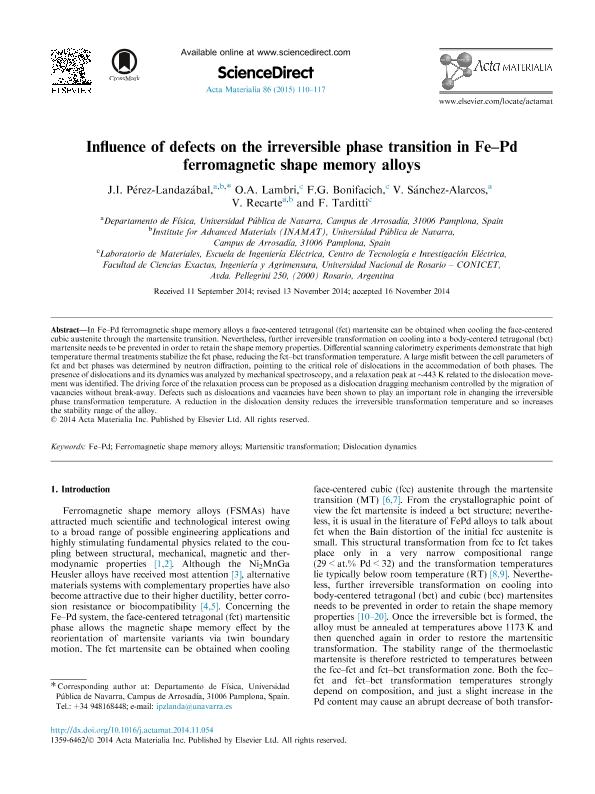Artículo
Influence of defects on the irreversible phase transition in Fe-Pd ferromagnetic shape memory alloys
Pérez Landazábal, J. I.; Lambri, Osvaldo Agustin F. ; Bonifacich, Federico Guillermo
; Bonifacich, Federico Guillermo ; Sánchez Alarcos, V.; Recarte, V.; Tarditti, Federico
; Sánchez Alarcos, V.; Recarte, V.; Tarditti, Federico
 ; Bonifacich, Federico Guillermo
; Bonifacich, Federico Guillermo ; Sánchez Alarcos, V.; Recarte, V.; Tarditti, Federico
; Sánchez Alarcos, V.; Recarte, V.; Tarditti, Federico
Fecha de publicación:
03/2015
Editorial:
Pergamon-Elsevier Science Ltd
Revista:
Acta Materialia
ISSN:
1359-6454
Idioma:
Inglés
Tipo de recurso:
Artículo publicado
Clasificación temática:
Resumen
In Fe-Pd ferromagnetic shape memory alloys a face-centered tetragonal (fct) martensite can be obtained when cooling the face-centered cubic austenite through the martensite transition. Nevertheless, further irreversible transformation on cooling into a body-centered tetragonal (bct) martensite needs to be prevented in order to retain the shape memory properties. Differential scanning calorimetry experiments demonstrate that high temperature thermal treatments stabilize the fct phase, reducing the fct-bct transformation temperature. A large misfit between the cell parameters of fct and bct phases was determined by neutron diffraction, pointing to the critical role of dislocations in the accommodation of both phases. The presence of dislocations and its dynamics was analyzed by mechanical spectroscopy, and a relaxation peak at ∼443 K related to the dislocation movement was identified. The driving force of the relaxation process can be proposed as a dislocation dragging mechanism controlled by the migration of vacancies without break-away. Defects such as dislocations and vacancies have been shown to play an important role in changing the irreversible phase transformation temperature. A reduction in the dislocation density reduces the irreversible transformation temperature and so increases the stability range of the alloy.
Archivos asociados
Licencia
Identificadores
Colecciones
Articulos(CCT - ROSARIO)
Articulos de CTRO.CIENTIFICO TECNOL.CONICET - ROSARIO
Articulos de CTRO.CIENTIFICO TECNOL.CONICET - ROSARIO
Citación
Pérez Landazábal, J. I.; Lambri, Osvaldo Agustin F.; Bonifacich, Federico Guillermo; Sánchez Alarcos, V.; Recarte, V.; et al.; Influence of defects on the irreversible phase transition in Fe-Pd ferromagnetic shape memory alloys; Pergamon-Elsevier Science Ltd; Acta Materialia; 86; 3-2015; 110-117
Compartir
Altmétricas



